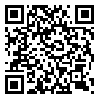Volume 4, Issue 4 (1-2017)
CPJ 2017, 4(4): 1-10 |
Back to browse issues page
Download citation:
BibTeX | RIS | EndNote | Medlars | ProCite | Reference Manager | RefWorks
Send citation to:



BibTeX | RIS | EndNote | Medlars | ProCite | Reference Manager | RefWorks
Send citation to:
بررسی ویژگیهای روانسنجی سیاهه گرایش به تفکر انتقادی در بین دانشجویان دانشگاههای جامع شهر تهران. CPJ 2017; 4 (4) :1-10
URL: http://jcp.khu.ac.ir/article-1-2514-en.html
URL: http://jcp.khu.ac.ir/article-1-2514-en.html
Abstract: (7567 Views)
The present study aimed to investigate the psychometric properties of the Dispositions to Critical Thinking Inventory (DCTI) among a normal sample of Iranian students. The present study is a correlation study. The population of the study consisted all students of Tehran’s universities (Shahid Beheshti University, Tehran University, and Shahed University). 330 students (175 females, 155 males) were selected by multi-stage cluster sampling. At first, the inventory was translated through double translation method and verified by the specialists. To assess construct validity, the exploratory factor analysis as well as internal consistency (Cronbach’s alpha) was used. To assess the convergent validity, the correlation coefficients between the DCTI and the California Critical Thinking Disposition Inventory (CCTDI) was used. Finally, in order to assess the reliability of the questionnaire, the test-retest after 2 weeks (N=40) and Cronbach’s coefficients were employed. Results from factor analysis and varimax rotation to determine construct validity showed that this inventory was saturated by three factors, innovativeness, maturity and commitment. To investigate its convergence validity, the results of correlation scores of the dispositions of critical thinking with the California critical thinking skills test score showed that the correlation between the critical thinking skills score and the California critical thinking skills test score was not significant, but it had a significant relationship with the two other factors. Using the internal consistency method, the Cronbach’s alpha for each of the subscales was calculated and following results obtained: 0.61 for innovativeness subscale, 0.38 for maturity, and 0.81 for commitment, which indicates dispositions to the critical thinking subscales had a positive and significant correlation with each other and with the total score of the inventory (r = 0.75). The obtained results of test-retest scores after one-week interval and internal correlation coefficient were calculated as follows: 0.564 for creativity, 0.372 for maturity, and 0.682 for commitment subscales.
According to the results of the present study, the DCTI can be used for educational and research goals in Iranian population.
According to the results of the present study, the DCTI can be used for educational and research goals in Iranian population.
Keywords: Key words: Dispositions to Critical Thinking, Psychometric properties, factor analysis, Standardization
Type of Study: Research |
Subject:
Special
Received: 2016/04/5 | Accepted: 2016/12/21 | Published: 2017/01/1
Received: 2016/04/5 | Accepted: 2016/12/21 | Published: 2017/01/1
| Rights and permissions | |
 |
This work is licensed under a Creative Commons Attribution-NonCommercial 4.0 International License. |




